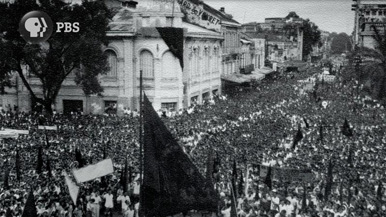TV Recap - The Vietnam War: Episode 1, Part 2
Episode 1
By Mark Light
September 25, 2017
To emphasize that, the film jumps to footage of the 1968 Chicago riots. These timeline jumps happen frequently in this episode and as mentioned in the part one recap, they are immensely effective. Burns and Novick take interview subjects and find the right photo or film to underscore their subjects' words.
In July of 1953, the settlement of Korean War was reached. Policymakers in the US took this as proof that communism could be contained in Asia. In the fall, the French asked to meet the Viet Minh in negotiations to end their war. Ho Chi Minh agreed to the Geneva meeting. But before that, both sides sought to strengthen their hand by battlefield victory.
In an instance of some of the dumbest military planning in history, General Navarre sought to draw the Viet Minh out into a fixed battle by putting a large force in isolation at a place called Dien Bien Phu. They were heavily fortified but in a valley. The French in picking their battlefield had conceded the high ground before the battle was even begun.
Arrogance, overconfidence, or underestimating their enemy's capacity - whatever the reason, this was a very poor plan. General Giap saw the flaw and decided to pounce and wipe out the French in Dien Bien Phu. In a logistical maneuver that should be studied in military academies worldwide, heavily camouflaged troops and artillery (broken down and hand carried, piece by piece) were moved into the mountains surrounding Dien Bien Phu. The French, hoping to spring a trap, were themselves trapped into a siege.
The film shows footage from Dien Bien Phu but it really doesn't capture how desperate the French conditions were. They begged Eisenhower to intervene but he wouldn't do so without both congressional approval and the support of our allies. Britain said no. Film footage of Senator John F. Kennedy is shown in which he states that the French are fighting for the maintenance of colonial rule. Before the US intervenes in his opinion, the Vietnamese should be granted independence.
Eisenhower did approve of covert American supply drops to the trapped French troops. And then the tragedy of what was to come is fixed in the film. Leslie Gelb, one of the interview subjects, states that everyone knew that Vietnam in and of itself didn't mean much. But everyone believed that it would be just the first domino to fall in a series of events that would turn all Southeast Asia communist. Eisenhower's voice is heard describing the falling domino theory. We reach another "what if" moment. What if we just stayed with the original assumption that Vietnam didn't mean much to the US in a geopolitical sense and left it at that? What if we didn't talk ourselves into the domino theory?
After being besieged for 55 days, the French surrendered at Dien Bien Phu. They had lost 8,000 men killed, wounded, and missing. General Giap had suffered three times the casualties but had won the victory. This too should be remembered for later, that Giap and the rest of the Viet Minh were willing to suffer enormous casualties if they thought they would prevail in the end.
Continued:
1
2
3
4




